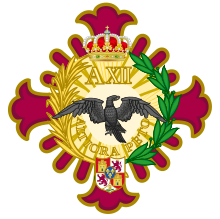Civil Order of Alfonso XII facts for kids
Quick facts for kids Civil Order of Alfonso XII |
|
|---|---|
 |
|
| Type | State order |
| Established | 23 May 1902 |
| Country | Spain |
| Motto | Altiora peto |
| Status | Abolished 2 September 1988 |
| Founder | Alfonso XIII of Spain |
| Grades |
|
Ribbon of the Order |
|
The Civil Order of Alfonso XII (Spanish: Orden Civil de Alfonso XII) was a special award from Spain. It was named after King Alfonso XII, who ruled from 1874 to 1885. This award was created on May 23, 1902. It was given to people who did great things in areas like education, science, culture, teaching, and research.
Contents
History of the Order
How the Award Started
The Civil Order of Alfonso XII was officially started by a special rule from the King on May 23, 1902. It was created to recognize people who made important contributions to learning and knowledge in Spain. The founder of this award was Alfonso XIII of Spain, who was the son of King Alfonso XII.
Different Levels of the Award
The award had three main levels, or categories, that people could receive:
- Grand Cross (called Gran Cruz in Spanish)
- Commander (called Encomienda in Spanish)
- Chevalier (called Caballero in Spanish)
These levels showed how important the person's achievements were.
Changes to the Order
Over time, things changed. Starting in 1939, people who had received the Civil Order of Alfonso XII could ask to join a new award called the Civil Order of Alfonso X, the Wise.
Later, on September 2, 1988, the Civil Order of Alfonso XII was officially replaced by this newer award. This change happened to make sure the awards system fit with modern society and the democratic rules of Spain.
Notable People Who Received the Award
Many famous and important people received the Civil Order of Alfonso XII for their work in different fields. Here are some of them:
- Mariano Benlliure (a famous sculptor)
- Sarah Bernhardt (a well-known actress)
- Julián Calleja y Sánchez (a doctor and scientist)
- Francisco Codera (an Arabist and scholar)
- Carlos Cortezo (a doctor and public health expert)
- Marie Curie (a pioneering scientist, Nobel Prize winner)
- José Echegaray (a writer and Nobel Prize winner)
- Cesáreo Fernández Duro (a naval historian)
- Francisco Fernández y González (a writer and politician)
- Álvaro de Figueroa (a politician)
- José García Barbón (a businessman and philanthropist)
- José Gómez de Arteche (a historian and military writer)
- Teodoro Llorente Falcó (a poet)
- Lucas Mallada (a geologist and paleontologist)
- Andrés Manjón (an educator)
- Carolina Marcial Dorado (an educator and writer)
- Marcelino Menéndez y Pelayo (a scholar and literary critic)
- Eugenio Montero Ríos (a politician)
- José Moreno Carbonero (a painter)
- José Morer (a doctor)
- Remigio Mugica (a publisher)
- The Orfeó Català (a famous choir)
- José María de Pereda (a novelist)
- Benito Pérez Galdós (a famous novelist)
- Francisco Pradilla Ortiz (a painter)
- Agustí Querol Subirats (a sculptor)
- Santiago Ramón y Cajal (a Nobel Prize-winning scientist)
- Arthur Rubinstein (a world-renowned pianist)
- Eduardo Saavedra (an engineer and historian)
- Vicente Santamaría de Paredes (a lawyer and politician)
- Joaquín Sorolla (a famous painter)
- Juan Valera y Alcalá-Galiano (a writer and diplomat)
- Ricardo Velázquez Bosco (an architect)
- Pedro Viteri (a politician and lawyer)
See also
 In Spanish: Orden de Alfonso XII para niños
In Spanish: Orden de Alfonso XII para niños
- Orders, decorations, and medals of Spain
 | Sharif Bey |
 | Hale Woodruff |
 | Richmond Barthé |
 | Purvis Young |

